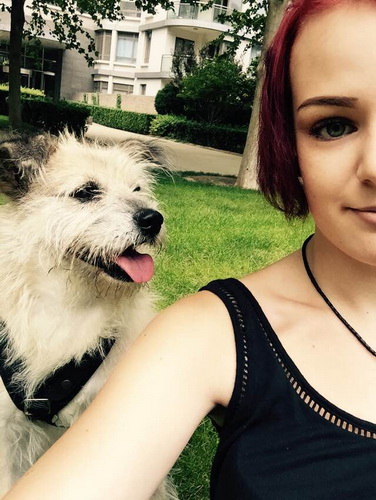
One such family was the Chybas. Lydia Chyba, a Year 12 student at British School of Beijing, was attending the show with her mother and her mother’s girlfriend when the latter, a fervent dog lover, grew determined to help the Little Adoption Shop financially, since they couldn’t adopt in their current situation. So some time after the show, they went to the shop on an open day and started playing with the dogs. “Most of them were super hyper and happy that we were playing with them,” Lydia tells me, “glad that we were there to return their affection. But in the corner was one dog sitting silently, waiting for all the other dogs to calm down. When they stopped jumping around, he slowly walked towards me and laid his head on my lap. He would flinch when I touched him because he was so scared, and after a while he walked away as well.”

“He also had an eye cataract so he couldn’t see what was going on,” Chyba adds. “I asked Christopher his name and he told me that it was Jackie, and pointed out Jackie’s brother Jack, who only had three legs, wagging his tail at us from another pen. Christopher told me their story and it really made me cry.”
“Jackie was supposed to be slaughtered and made into animal food. After being rescued from the meat trade – where dogs are frequently beaten, starved, and have to sleep in their own excrement – he was delivered to the hospital unconscious twice with extremely low body temperature. I was really sad that I couldn’t take him home with me that day. A little while later, I left the shop for ten minutes. When I came back, my mother took me and told me that she had adopted him. I was really surprised, but happy, especially knowing that he had lived in the pen at the shelter for a year because no one wanted to adopt an older stray dog.”

Christopher Barden said of the Chyba family: “They are the sweetest. If we had more families like theirs we would be able to pay all the bills and empty the shop in a week.”
“When we took him home for the first time,” Chyba continues, “he was terrified, just sitting in the corner. Every time someone came over he started hiding, because he was scared that he would be taken away again. But that was only temporary. After a few weeks, the eye cataract disappeared and now he’s a completely healthy and happy dog, and he’s more thankful for being rescued than any purebred puppy that would already come from a good place. Even though he’s a bit older, he’s still playing with us like a puppy, and he’s a really smart dog. Adopting him was the best choice.”

I asked her what she thought about the mutt vs. purebred debate. “Well,” she begins, “in our family we have a lot of experience. My grandpa bred greyhounds while my uncle adopted two dogs straight from the street. After I had an accident, the stray dog from my uncle followed my ambulance for several kilometers to the hospital because he did not want to leave me alone – even though he only sees me once a year. A purebred from a good place may not be as faithful, thankful and protective as a stray dog from the streets or even worse places, since they only know the good places.”



